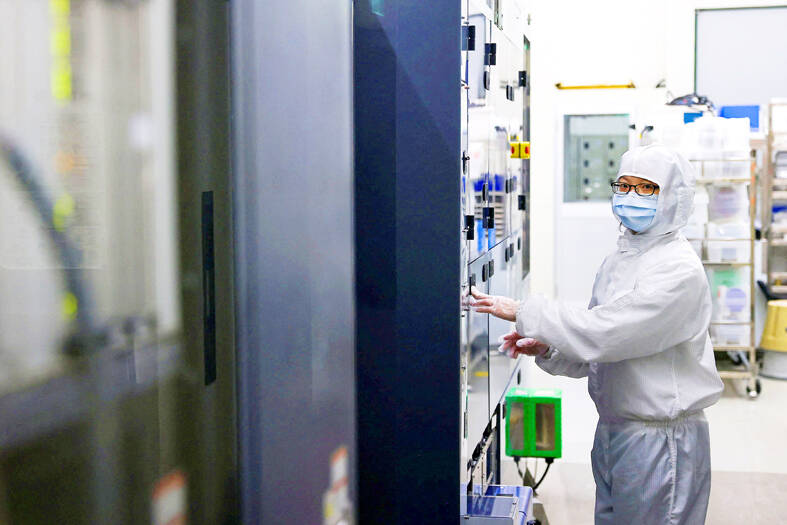Proposed amendments to the Intellectual Property and Commercial Court Organization Act (智慧財產及商業法院組織法) yesterday passed their third reading in the Legislative Yuan.
According to the changes, all first appellate court trials on the alleged theft of technology considered critical to national security would be handed to the Intellectual Property and Commercial Court.
Specifically, the court’s jurisdiction would extend to first trial cases for alleged contraventions of Article 13-1 of the Trade Secrets Act (營業祕密法), as well as all related civil lawsuits, and second trial cases on alleged breaches of the Trade Secrets Act.

Photo: Ann Wang, Reuters
Contravention of the acts in foreign territories, including China, Hong Kong or Macau, would be considered eligible for prosecution under the intellectual property and commercial court organization act, the amendments say.
The proposed amendments are in line with amendments to Article 18 of the National Security Act (國家安全法), approved on June 8 last year, which considers trade secrets a part of national security.
A previous amendment to the act on Jan. 12 states that contravening an investigation confidentiality protective order would no longer observe the principle of “no trial without complaint,” and that offenders could face up to five years in prison and a fine of NT$3 million (US$98,441).

The Ministry of Economic Affairs has fined Taobao NT$1.2 million (US$36,912) for advertisements that exceed its approved business scope, requiring the Chinese e-commerce platform to make corrections in the first half of this year or its license may be revoked. Lawmakers have called for stricter enforcement of Chinese e-commerce platforms and measures to prevent China from laundering its goods through Taiwan in response to US President Donald Trump’s heavy tariffs on China. The Legislative Yuan’s Finance Committee met today to discuss policies to prevent China from dumping goods in Taiwan, inviting government agencies to report. Democratic Progressive Party Legislator Kuo Kuo-wen (郭國文) said

The Ministry of Economic Affairs has fined Taobao NT$1.2 million (US$36,900) for advertisements that exceeded its approved business scope and ordered the Chinese e-commerce platform to make corrections in the first half of this year or its license would be revoked. Lawmakers have called for stricter supervision of Chinese e-commerce platforms and more stringent measures to prevent China from laundering its goods through Taiwan as US President Donald Trump’s administration cracks down on origin laundering. The legislature’s Finance Committee yesterday met to discuss policies to prevent China from dumping goods in Taiwan, inviting government agencies to report on the matter. Democratic Progressive Party

Taiwan and its Pacific ally Tuvalu on Tuesday signed two accords aimed at facilitating bilateral cooperation on labor affairs, according to Taiwan’s Ministry of Foreign Affairs (MOFA). The governments inked two agreements in Taipei, witnessed by Foreign Minister Lin Chia-lung (林佳龍) and visiting Deputy Tuvaluan Prime Minister Panapasi Nelesone, MOFA said in a news release. According to MOFA, the agreements will facilitate cooperation on labor issues and allow the two sides to mutually recognize seafarers’ certificates and related training. Taiwan would also continue to collaborate with Tuvalu across various fields to promote economic prosperity as well as the well-being of their

Sung Chien-liang (宋建樑), who led efforts to recall Democratic Progressive Party (DPP) Legislator Lee Kun-cheng (李坤城), was released on bail of NT$80,000 today amid outcry over his decision to wear a Nazi armband to questioning the night before. Sung arrived at the New Taipei District Prosecutors’ Office for questioning in a recall petition forgery case last night wearing a red armband bearing a swastika, carrying a copy of Adolf Hitler’s Mein Kampf and giving a Nazi salute. Sung left the building at 1:15am without the armband and covering the book with his coat. Lee said today that this is a serious